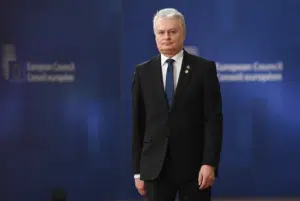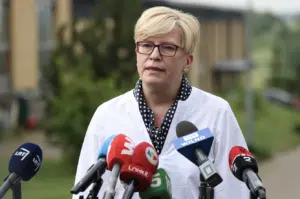Brussels – It was a repeat of 2019 but with an even starker result. Lithuania’s incumbent President, Gitanas Nausėda, triumphed in yesterday’s (May 26) presidential runoff against challenger and incumbent Prime Minister, Ingrida Šimonytė, receiving from voters a mandate for a second five-year term at the helm of the Baltic country in the first round of the super-election year.

After the already clear indication of voters’ intentions at the first round on May 12, the results of yesterday’s runoff rewarded the outgoing President and candidate of the Social Democratic Party of Lithuania (LSDP) and the Lithuanian Regions Party (LRP) with almost three out of every four votes (74.44 percent). In contrast, the Prime Minister and candidate of the center-right Union of the Fatherland-Christian Democrats of Lithuania (Ts-Lkd) stalled at 24.06 percent of the vote, less than five percentage points higher than in the first round. But the most alarming is the voter turnout figure, which saw a 10 percentage point drop between the first and second rounds, falling to 48.41 percent, not even one in two eligible voters.
In anticipation of what will happen at the ballot box in the European elections (scheduled for June 9 in Lithuania) and the legislative elections on October 13, the presidential election campaign has focused mainly on the issue of the relationship with Russia and the Kremlin’s expansionist policy, also in light of the recent border provocations in the Baltic region (the latest against Estonia). Like the other Baltic and Eastern European countries, Lithuania was also part of the Soviet Union and was the first republic to declare independence in March 1990. More than 30 years later – with the invasion of Ukraine continuing unabated -according to several national polls, more than half of Lithuanian citizens fear that the country could be among the targets of Russian aggression (despite being a NATO member for 20 years). Vilnius’ intelligence has warned that Moscow is ready to strengthen its military capabilities along the border with Atlantic Alliance members.

In Lithuania, the President represents the country at European Union and NATO summits and has a semi-executive role: together with the government, he sets foreign and security policy, can veto laws, and has a say in appointing key officials. Both Nausėda and Šimonytė are in favor of increasing defense spending to at least 3 percent of Lithuanian GDP from the 2.75 planned for this year (the minimum threshold required of NATO members is 2) – which should allow for the cost of modernizing the army and infrastructure and for a German brigade to be deployed in Lithuania from 2027. They also both support the need to increase military support for the defense of Ukraine, especially air defenses. “Lithuania’s independence and freedom are like a fragile boat that we must protect and prevent from cracking,” the re-elected President said last night.
Despite being on the left side of the Lithuanian political spectrum, Nausėda is a social conservative and strongly opposes same-sex civil unions (while conservative Prime Minister Šimonytė is strongly in support). The president, in power until 2029, argues that civil unions would be too similar to marriage, which, according to the Lithuanian Constitution, is allowed only between a man and a woman. The Prime Minister several times accused Nausėda and the parties supporting him of homophobia and of being “contrary to the principles of liberal democracy.” After the publication of the presidential results in Lithuania, the leaders of the EU institutions in Brussels congratulated him. “Together, we are working to make the EU stronger, more sovereign, and more influential,” said on X the President of the European Council, Charles Michel: “I know that we can also count on your unwavering support for the people of Ukraine.” Similar words to those chosen by the number one of the EU Commission, Ursula von der Leyen, who said: “I look forward to your continued firm leadership in response to Russia’s war of aggression against Ukraine.”
English version by the Translation Service of Withub





